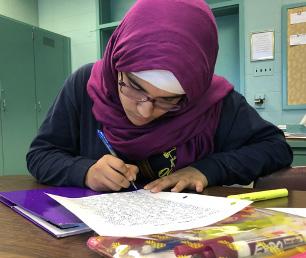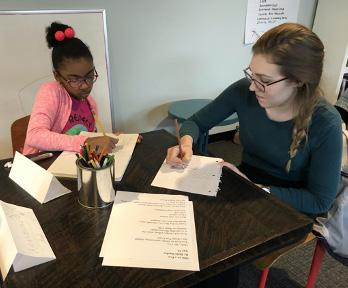
9 minute read
WRITING OUR FUTURE
RIGHTING WRONGS & TELLING STORIES OF LOVE
In the middle of the day when she would otherwise be inside a classroom, an 11-year-old named Josie is learning remotely at home. Online classes end, but Josie is still engaged and learning. She can’t help but absorb the relentless news stories about the pandemic, political change, and the uncertainty ahead. When Young Authors Greenhouse put out a call for students to submit their thoughts and feelings about current events, Josie was the first to respond. She wrote:
Advertisement
“Not everyone is infected, but everyone is affected. I’ve been thinking a lot about how this pandemic is some part of history that we need to remember. And I’ve tried to preserve the suffering as best I could. But still, it doesn’t really feel like history. It feels like here and now. It feels like fear, pain, and sadness.”
Josie’s letter perfectly set the stage for the flurry of letters that were submitted by other students. It turns out that young adults in Louisville are sharing many of the same emotions — from fear and anxiety to disappointment and anger.
Yet, it’s through suffering that healing can happen. And when nurtured properly, that healing transforms into growth.
“Writing has always been an important tool for processing emotions, connecting with others, and growing a deeper understanding about one’s experiences and self,” says Jeannette Bahouth, Executive Director at Young Authors Greenhouse.
Knowing this, the team at Young Authors Greenhouse prioritized writing programs for youth that offer opportunities for social emotional learning, processing, and healing. Students are encouraged to share their perspective on these pivotal moments, and their words are honored through publication. These are their stories.

A Young Authors Greenhouse participant writes her feelings about current events. Photo courtesy of Fund for the Arts.
WE WILL WRITE THROUGH THIS
When Young Authors Greenhouse transitioned to virtual programs this year, the team thought a lot about how to create community and connection in new, uncharted virtual waters. Normally, programs are offered in person in schools and at the organization’s writing center. Leadership asked themselves: “How do we keep students engaged? How can we build meaningful connections through a computer? How can we make a difference that is specific to these times?”
What they realized is that the answer is at the heart of the organization’s work: writing.
Even if students have never met in real life, they are excited to share their work with one another. It’s not uncommon for messages of appreciation and encouragement to fill up the chat box after a student shares their work. Genuine expressions such as, “Wow! That was amazing!” and the reply, “So is yours!” fill the screen.
“Writing is connection,” Bahouth says, “so even though we are all in different rooms, different neighborhoods, we are still building a community through writing and sharing stories.”
Writing has always been a unique tool to process emotions. It allows the writer to reflect and gain a deeper understanding about their experiences and self. The writing process requires the writer to identify their thoughts, then distill those feelings into words that can be shared with others. The result? Validation, community, and an inspired path forward.
— Jeannette Bahouth, Executive Director at Young Authors Greenhouse.
"This is Where My Joy Stands" is a collection of essays and poems by young authors at Olmsted Academy South, Western Middle School, and Southern High School.
Young Authors Greenhouse launched its We Will Write Through This initiative to give young people ages 6 to 18 an opportunity to share their stories about the pandemic and ongoing civil unrest. Here’s a sample of the most recent submissions:
“Dear Healthcare Workers: I just want to say thank you for helping everyone. Thank you for making sure everyone is safe. Thank you for staying up late and working long hours to save our lives. Thank you for risking your life to save us. Thank you. You could be at home taking care of your own family and making sure they are safe. But you are caring for us. You could not even care about anyone. But you do. So thank you for this. Thank you.” – Amora, Age 11
I am a lonely tulip. Roses and daises glowing straight through life, while I am stuck in this time of lies. Whispers and rumors scarring my stem. My leaves falling to the ground. As the pond reflects the moon, winter around the corner, A rainbow winks at the world below and says, “You are a firefly, glowing brighter and brighter. Flying higher and higher, remember you matter!” – Aya, Melany, Banaz, and Christalyn, Grade 8
Just because our skin is dark and our hair is coiled doesn’t mean that we don’t deserve to have what most people are born with — justice. – Khilah, Age 13
If I Were President: “Equality for all, justice for all, freedom for all, the things I will live by, lead by.” – Sloane, Age 13
Reflecting on the writing that has been submitted to Young Authors Greenhouse, Bahouth says, “Young people are holding so much and, if anything, a re-emerging theme has been the importance of speaking up and speaking the truth.” A lot has happened over the past year, and students are still processing what it means to stay home because of a pandemic, live through a historic event, witness or even attend protests here in Louisville, call for justice, hope for the future, wait for the arrival of a vaccine, and see a new president and vice president.
These events have caused students to experience shared feelings of loss, fear, anxiety, loneliness, financial hardship, inequity, and injustice. Writing is an immediately accessible tool to help process those feelings.
LOVE AND SELF
When we think of love, we probably think of romantic relationships, our love for pets, or abundant warmth towards family and friends.
But before we can share love with others, we must first love ourselves.
Young Authors Greenhouse empowers each to student to see themselves as authors, feel they are being taken seriously, and feel proud of their work. This can only be accomplished when they write about something that is meaningful to them and their own lives.
“Young people have important things to say, and our goal is for their voices and opinions to take the lead. Writing can and should be fun,” Bahouth says.
While students certainly show love for their peers, they also show themselves love through the power of the written word. Take a look:
"I am the breeze that flows through trees, the breath that sets us free. I am a writer that distinguishes the truth between you and me, this is me." — Rakoryiah

A Young Authors Greenhouse instructor guides a student during a recent writing workshop. Photo courtesy of Fund for the Arts.
"I see the world as it is and can only hope the world can see me as I am. I am inspired and confident. I grow every day like the flowers and I fly every day like the wind in hopes to find something new." — Elizabeth "I am the daughter who has broken a stereotype in her family. One who will stand up for the Asian writers of the future. Past Asian writers call to me, to stand up." — Mala “Writing makes me feel important.” — Egzona, age 14 “Your heart is the plant of your body. Let kindness grow out of you.” — Alyce, age 9 “We need one another like the sun and the moon need each other to make the perfect day.” — Esmeralda, age 13
PASSING THE PEN
One of the unique things about mentorship is that the torch is never truly passed. Rather, a new flame is kindled. When volunteers work with students, Young Authors Greenhouse is intentional about flipping the traditional power structure between youth and adults. Students are encouraged to lead projects and the conversation. Volunteers sit back and listen intently to students, encouraging their unique writing process, providing suggestions, and validating each student’s experiences and emotions.
“The conversations between students and volunteers are electric, motivating, and impactful,” Bahouth says. “You might hear, ‘Wow, write that down!’ You might feel the stillness in the room after a student shares a powerful piece — the stillness before someone says, ‘I have goosebumps.’ And then a symphony of snapping, of encouragement. We see the power of having a community of caring, engaged people who say, ‘Your story is important. Your voice matters.’” Despite the importance of writing, the pandemic has reminded us of the fragility of artistic development. When budget shortfalls arise and government deficits take the spotlight, funding for the arts is often first on the chopping block. We hear a growing chorus of experts promoting the importance of STEM (science, technology, engineering, and mathematics) courses for today’s students. They argue that focusing on STEM courses will improve job prospects in the future and contribute to a healthier society. Still, the importance of investing in students and their writing craft cannot be overstated.
Bahouth sums it up best: “Technology continues to advance in wonderful ways, but those incredible advances can’t happen without imagination, creativity, and bold leadership. And I predict we will need more people who know how to relate to another person, who can imagine what it might be like to be someone else so that we might better understand what we need as a society, than people who only have technical expertise in science and math.
“When we cultivate the natural curiosity of our young people and encourage them to hold the pen, so to speak, we are showing them that learning is not merely knowledge or the acquisition of facts, it’s understanding how to find an answer by asking lots of questions, how to pursue an interest, how to deep dive into a thought and rally others to care about that thought,” she adds. “Writing is thinking and communication. We can’t predict what we will need 20 years from now, but we can empower our young people with the skills to figure it out. That’s what writing does.”
CALLING ALL YOUNG WRITERS!
Young writers ages 6 to 18 are invited to participate in the We Will Write Through This project. Free writing prompts are available in both English and Spanish from the Young Authors Greenhouse website. All writing submissions for this project will either be published online or in a large, city-wide anthology next year. Students can submit writing here. Adults interested in volunteering can check out opportunities here, fill out an application here, and attend one of two upcoming volunteer training sessions February 9 at 2 PM or February 25 at 6 PM.
Young Authors Greenhouse is a recipient of the Cultural Lou Recovery Grant from Fund for the Arts.
Art is critical to our recovery because we can’t move forward without addressing and tending to the very real feelings of our experiences this year. Art is a powerful way to process those emotions.
As Mr. Rogers famously said, “Anything that's human is mentionable, and anything that is mentionable can be more manageable. When we can talk about our feelings, they become less overwhelming, less upsetting, and less scary. The people we trust with that important talk can help us know that we are not alone.”



